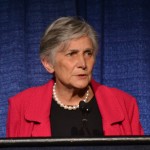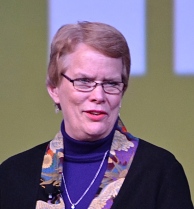Common Core Presentations and Omissions
Diane Ravitch (Jan. 2012; photo by the author)
Still thinking over the presentations I attended at the recent ASCD Conference, I was struck by some other recent blog posts about the Common Core standards transition. There’s been a recent back-and-forth exchange of posts debating a number of issues relating to the CCSS, involving Marc Tucker, Diane Ravitch, and Stephen Krashen. Tucker just posted in EdWeek his “Last Round…” in that exchange, and from his post, you can follow plenty of other links to additional stages in the debate. I went through a similar exchange with Dr. Krashen and Dr. Paul W. Thomas here at InterACT, beginning when I posted about my willingness to use Common Core implementation as a vehicle for more teacher leadership, despite concerns about the standards and the possible testing regimen ahead of us. (And again, you could use that link as a jumping off point for a whole host of additional posts and arguments).
The main problem with the debate, as I see it, is the tendency to slip from one argument to another. In any given exchange, we mix questions of how the standards were designed, their likely consequences for students, teachers, and schools, their costs, feasibility, and other issues. If you want to land completely on one side or other in the debate, maybe it makes sense to whirl all those ideas into the mix at once. As someone occupying a middle ground, I find the debates informative but not very productive.
But thinking back now to the ASCD conference, I’ll say this: I went to at least five presentations (and stayed through four of them) in which the Common Core was discussed by some authors and presenters very well-known in our field – Carol Ann Tomlinson, Heidi Hayes Jacobs, Jay McTighe, and a few others. I also wrote in some detail about the last of the presentations I attended, by Sandra Alberti. And while I heard plenty of ideas about teaching and learning, and even some ideas about supporting teachers in this work, I heard next to nothing about the PARCC and Smarter Balanced assessments, about their costs or their implications for educational programs and policies.
I have to admit, both consortia offered presentations at the conference, and I didn’t attend those sessions. But it’s remarkable to me that everyone else seems to be talking about the CCSS transition with minimal recognition of the potential (likely) negative impacts that the assessment programs will have. Let’s balance out the idealistic visions of what could be with a little more practical assessment of the assessments, such as this one by Shaun Johnson. Based on his experiences and ideas about some typical schools, he suggests a number of negative impacts on instructional time, for example: “This could mean as many as 18 straight days of testing, or a full three and a half weeks of school, or approximately ten percent of the entire school year.”
What about the financial costs? Will states that signed on to CCSS balk when the invoices begin to arrive? Recent news item from Oklahoma:
“[Rep. Gus] Blackwell said he was told it could cost $250 million to implement the standards, or more than twice the amount of new money legislative leaders are considering to fund common education for the 2014 fiscal year, which begins July 1.
“Someone is going to make a boatload of money off of this,” he said. “That boatload of money is not going to go to Oklahoma teachers, it’s not going to go to Oklahoma schools, it’s not going to go to educate Oklahoma kids. It’s going to go to testing companies in other states.”
And then there’s the technological demands of the assessment regimen. Now, I’m all in favor of schools upgrading their computing and internet capacity, but CCSS should not be the driver. First of all, when budgets are tight, unfunded mandates are the enemy, preventing local policy makers from having enough discretion in their spending. Second, technology decisisons should be guided by teaching and learning priorities rather than assessment priorities. CCSS advocates would probably say these assessments will improve teaching and learning, and therefore the technology investment will pay off. I’d like to trust local teachers, technology specialists and policy makers to reach that determination for themselves.
I’m truly ambivalent about these standards; I don’t wish to see to see the whole enterprise fail, but I’m not yet convinced that its success is important or feasible. At the local level, I’ll engage in whatever dialogue and collaboration has the potential to help our students, and I’ll speak out if and when I see problems. But I hope advocates of Common Core begin to recognize that near-silence on these practical matters won’t help anybody. CCSS advocates would be better off acknowledging the problems and counseling more flexibility and patience, rather than putting on an air of unwarranted confidence. Downplaying the problems or pretending they’re being adequately addressed is just setting us up for a fall.
This blog post has been shared by permission from the author.
Readers wishing to comment on the content are encouraged to do so via the link to the original post.
Find the original post here:
The views expressed by the blogger are not necessarily those of NEPC.


